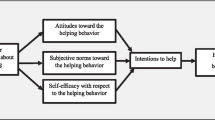Abstract
Gender differences in the provision and receipt of emotional support may result from differences in the formation of responsibility and effort attributions in support-seeking interactions. Participants (N = 1,211, primarily middle-class, European American college students) read support-seeking scenarios that varied in support-seeker gender, responsibility for the problem, and effort to resolve the problem, as well as the problem itself, and completed measures of responsibility, effort attributions, and emotions (anger, sympathy). Results indicated qualified and subtle gender differences in attributions, emotions, and attribution--emotion associations, which are broadly consistent with the application of gendered moral orientations and instrumentality norms. These findings are discussed with respect to theorizing about gender differences in attribution processes and emotional support behavior.
Similar content being viewed by others
References
Akiyama, H., Elliott, K., & Antonucci, T. C. (1996). Same-sex and cross-sex relationships. Journals of Gerontology Series B-Psychological Sciences and Social Sciences, 51B(6), P374-P382.
Auster, C. J., & Ohm, S. C. (2000). Masculinity and femininity in contemporary American society: A reevaluation using the Bem Sex-Role Inventory. Sex Roles, 43, 499–528.
Ben-Zur, H., & Zeidner, M. (1996). Gender differences in coping reactions under community crisis and daily routine conditions. Personality and Individual Differences, 20, 331–340.
Burda, P. C., Jr., Vaux, A., & Schill, T. (1984). Social support resources: Variation across sex and sex role. Personality and Social Psychology Bulletin, 10, 119–126.
Caprara, G. V., Pastorelli, C., & Weiner, B. (1997). Linkagesbetween causal ascriptions, emotion, and behaviour. International Journal of Behavioral Development, 20, 153–162.
Cunningham, M. R., & Barbee, A. P. (2000). Social support. In C. Hendrick & S. S. Hendrick (Eds.), Close relationships:A sourcebook (pp. 273–286). Thousand Oaks, CA: Sage.
Eagly, A. H., & Crowley, M. (1986). Gender and helping behavior: A meta-analytic review of the social psychological literature. Psychological Bulletin, 100, 283–308.
Eagly, A. H., Wood, W., & Diekman, A. B. (2000). Social roletheory of sex differences and similarities: A current appraisal. In T. Eckes & H. M. Trautner (Eds.), The developmental social psychology of gender (pp. 123–174). Mahwah, NJ: Erlbaum.
George, D. M., Carroll, P., Kersnick, R., & Calderon, K. (1998). Gender-related patterns of helping among friends. Psychology of Women Quarterly, 22, 685–704.
Gilligan, C. (1982). In a different voice: Psychological theory and women's development. Cambridge, MA: Harvard University Press.
Jackson, S. (1992). Message effects research. New York: Guilford Press.
Jackson, S., & Brashers, D. E. (1994). Random factors in ANOVA (Vol. 98). Thousand Oaks, CA: Sage.
Jaffee, S., & Hyde, J. S. (2000). Gender differences in moral orientation: A meta-analysis. Psychological Bulletin, 126, 703–726.
Jansz, J. (2000). Masculinity and restrictive emotionality. InA. H. Fischer (Ed.), Gender and emotion: Social psychologicalperspectives (pp. 166–186). Cambridge, UK: Cambridge University Press.
Karasawa, K. (1991). The effects of onset and offset responsibility on affects and helping judgments. Journal of Applied Social Psychology, 21, 482–499.
Kojima, M. (1992). An analysis of attributional processes in helping behavior. Bulletin of the Tamagawa Guken Junior College for Women, 17, 57–83.
Kunkel, A. W., & Burleson, B. R. (1998). Social support and the emotional lives of men and women: An assessment of the different cultures perspective. In D. J. Canary & K. Dindia (Eds.), Sex differences and similarities in communication (pp. 101–125). Mahwah, NJ: Erlbaum.
Kunkel, A. W., & Burleson, B. R. (1999). Assessing explanations for sex differences in emotional support: A test of the different cultures and skill specialization accounts. Human Communication Research, 25, 307–340.
Levant, R. F., Hirsch, L., Celentano, E., Cozza, T., Hill, S., MacEachern, M., et al. (1992). The male role: An investigation of norms and stereotypes. Journal of Mental Health Counseling, 14, 325–377.
MacGeorge, E. L. (1999). The influence of situational variation, associated attributions, and emotions on support providers' interaction goals [Doctoral dissertation, University of Illinois, 1999]. Dissertation Abstracts International, 60, 3201.
MacGeorge, E. L. (2001). Support providers' interaction goals: The influence of attributions and emotions. Communication Monographs, 68, 72–97.
MacGeorge, E. L., Clark, R. A., & Gillihan, S. (2001). Explaining sex differences in the evaluation of comforting messages: The mediating role of interaction goals. Communication Reports, 15, 17–28.
Ptacek, J. T., Smith, R. E., & Dodge, K. L. (1994). Gender differences in coping with stress: When stressor and appraisals do not differ. Personality and Social Psychology Bulletin, 20, 421–430.
Samter, W. (2001). How gender and cognitive complexity influence the provision of emotional support: A study of indirect effects. Communication Reports, 15, 5–16.
Schwarzer, R., & Weiner, B. (1991). Stigma controllability and coping as predictors of emotions and social support. Journal of Social and Personal Relationships, 8, 133–140.
Spence, J. T., & Helmreich, R. L. (1978). Masculinity and femininity: Their psychological dimensions, correlates, and antecedants. Austin: University of Texas Press.
Swim, J. K., & Sanna, L. J. (1996). He's skilled, she's lucky: A meta-analysis of observers' attributions for women's and men's successes and failures. Personality and Social Psychology Bulletin, 22, 507–519.
Twenge, J. M. (1997). Changes in masculine and feminine traits over time: A meta-analysis. Sex Roles, 36, 305–325.
Weiner, B. (1995). Judgments of responsibility: A foundation for a theory of social conduct. New York: Guilford Press.
Wood, J. T. (1997). Gendered lives: Communication, gender, and culture (2nd ed.). Belmont, CA: Wadsworth.
Workman, J. E., & Freeburg, E. W. (1999). An examination of date rape, victim dress, and perceiver variables within the context of attribution theory. Sex Roles, 41, 261–277.
Zucker, G. S., & Weiner, B. (1993). Conservatism and perceptions of poverty: An attributional analysis. Journal of Applied Social Psychology, 23, 925–943.
Author information
Authors and Affiliations
Corresponding author
Rights and permissions
About this article
Cite this article
MacGeorge, E.L. Gender Differences in Attributions and Emotions in Helping Contexts. Sex Roles 48, 175–182 (2003). https://doi.org/10.1023/A:1022459507110
Issue Date:
DOI: https://doi.org/10.1023/A:1022459507110




